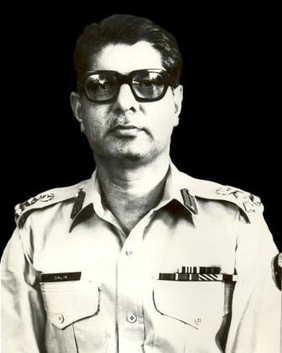Siddique Salik
Lua error in package.lua at line 80: module 'strict' not found.
|
Siddique Salik
|
|
|---|---|

Brigadier-General Siddiq Salik, PA.
|
|
| Birth name | Muhammad Siddique Salik |
| Born | September 6, 1935 Gujrat, Gujrat District, Punjab, British India |
| Died | Script error: The function "death_date_and_age" does not exist. Bahawalpur, Punjab province (Bahawalpur incident) |
| Allegiance | |
| Service/ |
|
| Years of service | 1960-1988 |
| Rank | |
| Unit | Guides Cavalry, Frontier Force Corps |
| Commands held | Inter Services Public Relations Ministry of Media Broadcasting 75th Army Air Defence Brigade |
| Battles/wars | Indo-Pakistani War of 1965 Aerial warfare in 1965 India Pakistan War Bangladesh-Pakistani War of 1971 East Pakistan Air Operations, 1971 |
| Awards | Sitara-e-Imtiaz (military) |
Brigadier-General Muhammad Siddiq Salik (Urdu: برگیڈیر جنرل محمد صدیق سالک; September 6, 1935 – August 17, 1988) SI(M), was one of the high profile military officer and public face of military government of President and chief of army staff General Zia-ul-Haq, serving as the media minister and the heading the Directorate-General for the Inter Services Public Relations (ISPR) from August 1985 till his death in 1988.
Early life and education
Siddique Salik was born in village Manglia Kharian, Gujrat District, Punjab, to a Muslim Jat family. Salik schooled in Lahore and graduated from Islamia College, Civil Lines, Lahore earning a degree in English literature and international relations. Before receiving his commission in the Pakistan Army, Salik had taught English literature in few colleges in Lahore and Abbottabad.
Indo- Pak War of 1965 and Bangladesh- Pakistan war 1971
Salik fought in the Indo-Pakistani War of 1965. In 1971, Salik, as Major, was stationed in East Pakistan, now Bangladesh, when the 1971 Bangladesh independence war against Pakistan (fought between 26 March-16 December) and Indo-Pakistani War of 1971 (fought between 3 December-16 December) took place. Captured by Indian troops on December 19, 1971, Salik was incarcerated in Agra jail before being shifted to various other prisons as a Prisoner of War. He was eventually handed over to Pakistan under the Simla Agreement which vouched for exchange of prisoners. Salik wrote a book titled Witness to Surrender (Urdu version: "Meinay Dhaka Doobtay Dekha") based on his recollection of the war.
1977 Coup Attempt
In 1977, General Zia became President of Pakistan following a bloodless coup. Zia-ul-Haq removed civilian officers from top posts and appointed a new military junta, which included Salik amongst its members. On August 17, 1988, Salik was traveling with President Zia in his plane as his press secretary and director general inter services public relations, along with U.S. ambassador Arnold Raphel, when the plane crashed under mysterious circumstances killing all on board. Salik authored six Urdu and 3 English books. Among these, the "Witness to Surrender" (ISBN 81-7062-108-9) recounts the 1971 Bangladesh independence war against Pakistan, as seen by Salik who was posted there as the Public Relations Officer.
His other books include Humaa yaraan dozakh (a recollection of his years as a prisoner of war after the fall of Dacca, East Pakistan), Ta damay tehreer (Urdu), Emergency, Pressure cooker (both novels in Urdu), Salute (biography of his years in army), State vs Politics, A case study of Pakistan. All his books became best sellers. Brigaidier Siddique Salik is survived by his widow,three daughters and a son. His son Sarmad Salik is a known Islamabad based journalist. He has been director news of state run TV channel Ptv and director current affairs of Ary news besides having worked for national and international newspapers and TV networks. He is now Channel Head of PTV News, heading successfully both Current Affairs and News department. He was appointed due to the weak directors of both departments who have reached their respective positions out of political connections and seniority. He is well known to be straightforward and a good leader and decision taker like his Shaheed father.